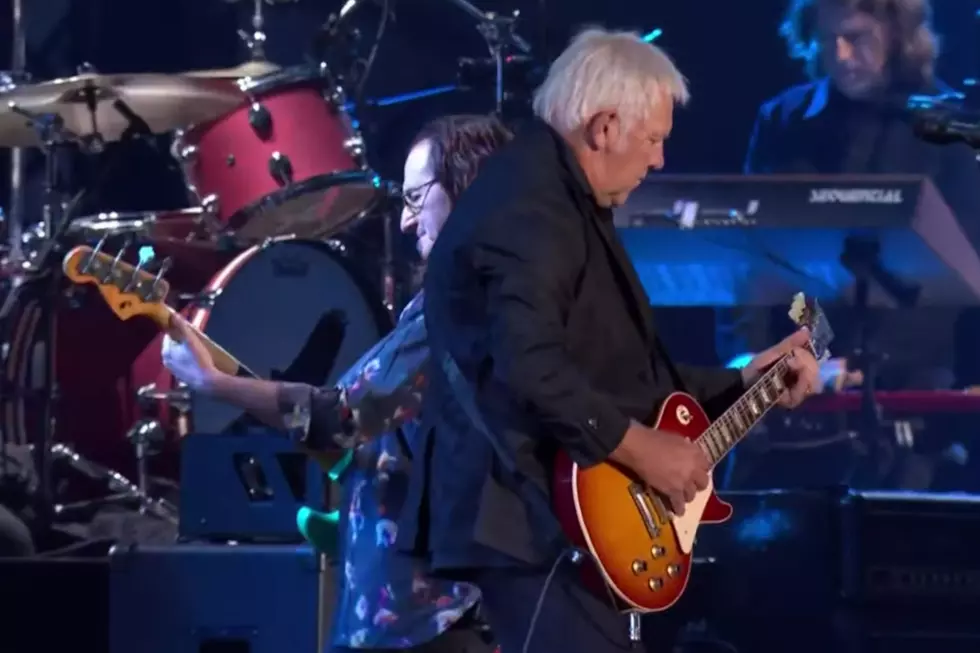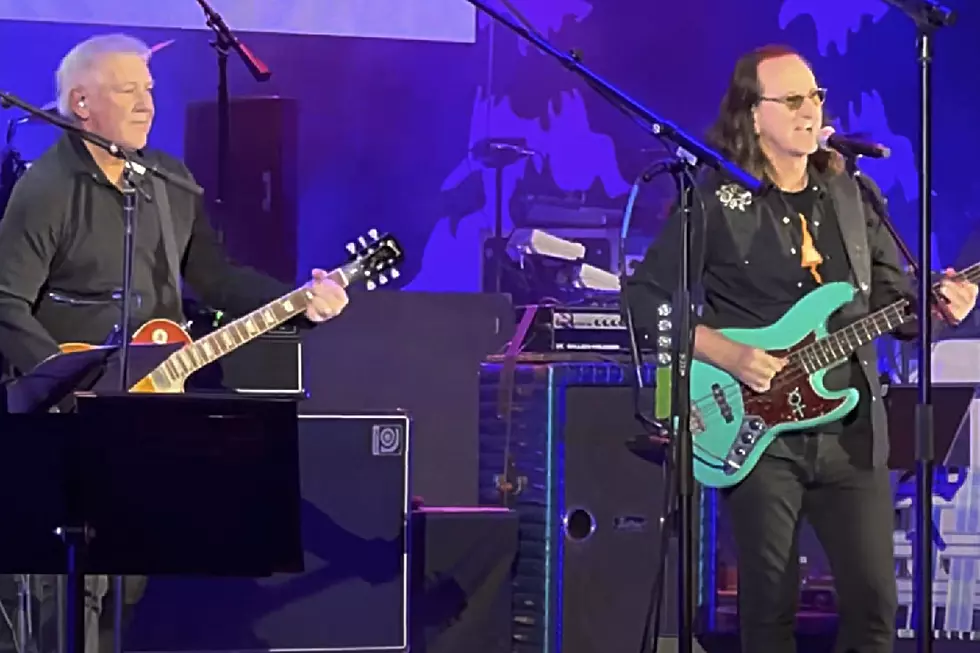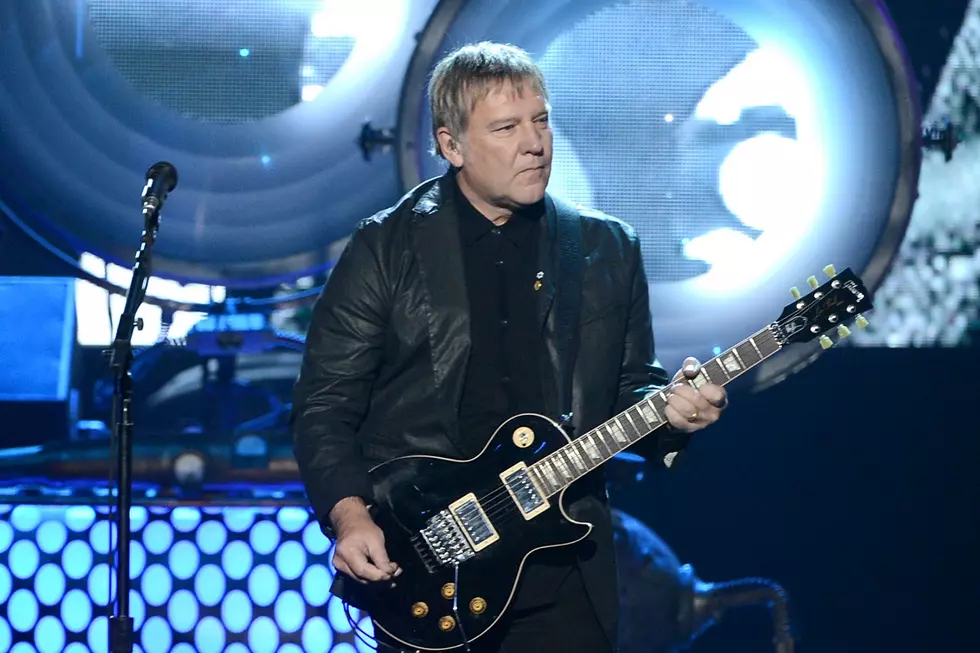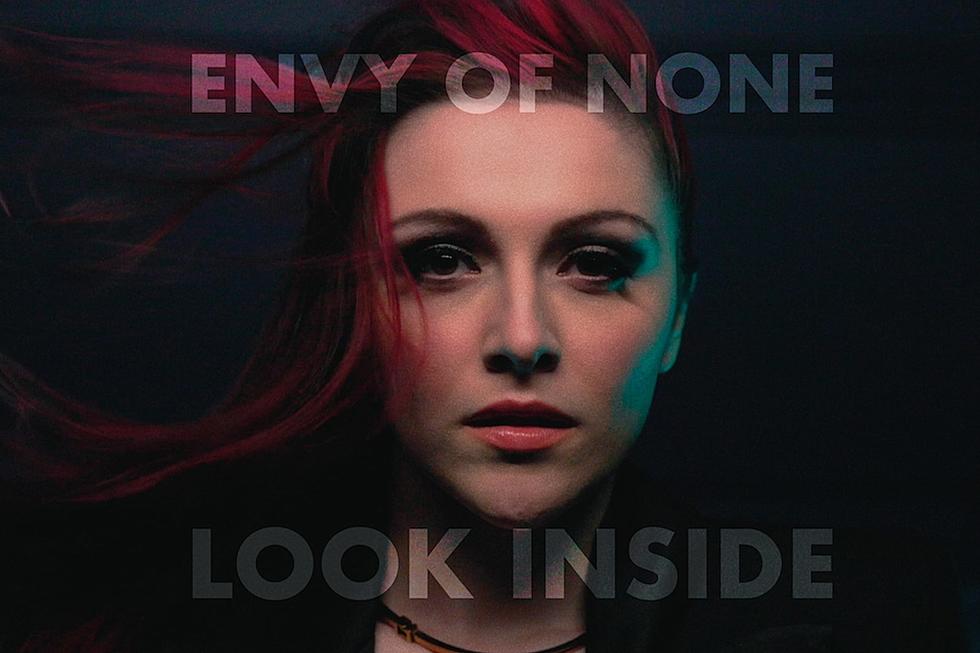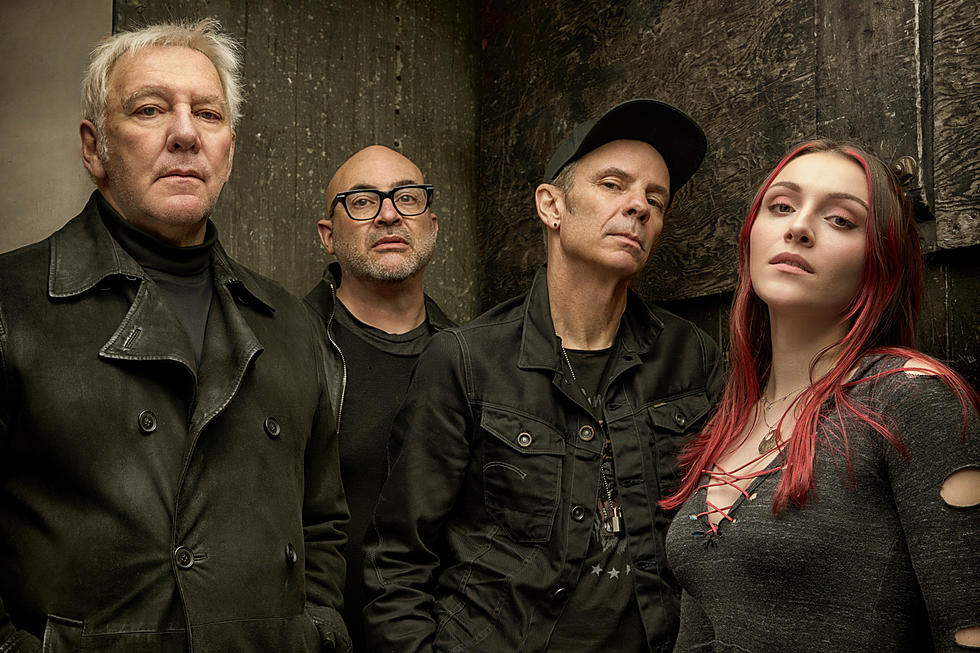
Alex Lifeson Had ‘No Rules’ With New Envy of None Album
It's clear that Alex Lifeson and vocalist Maiah Wynne are kindred spirits, even though they found their musical way in different eras.
The Rush guitarist joined us from his Toronto studio, with a bevy of different instruments on the wall behind him. Wynne was similarly surrounded by a tantalizing selection of things with strings – and even some others without – in her Portland studio.
Lifeson and Wynne felt a creative freedom reflected in these settings, following wherever the muse might take them and using whatever instrumentation the song called for. At times, they realized some things perhaps didn’t quite fit (banjo, in Lifeson’s case). But as their new band Envy of None took shape alongside Lifeson’s longtime associate Andy Curran and Alfio “Alf” Annibalini, they reveled in being able to work without boundaries.
All four members worked together in true collaboration, even though they were separated by the ongoing pandemic. Their fleshed-out ideas eventually became the band's self-titled debut album, set for release on April 8.
Curran has previously cautioned fans to manage their expectations, since Envy of None is so far removed from what they might expect to hear from a member of Rush. Still, it should come as no surprise to those who heard Victor in the ‘90s that Lifeson likes to explore new horizons. He ups the ante with Envy of None, as the group mixes dark melodies with contemporary pop, stylistically weaving alternative, industrial and synth rock together across 11 tracks.
Lifeson and Wynne joined UCR in advance of the album’s arrival to discuss how it all came together.
You’re making some waves with the news that you’re auctioning off some of your guitars. But it looks like you still have a few things around to make music.
Alex Lifeson: I packed them up a couple of weeks ago and, and I thought I had a few guitars left. Then, I started counting [what's at] my old studio and [in] storage, and ended up at like 30 other guitars. So my toolbox is still pretty full.
Last time we spoke, you had just moved into a new apartment and set up a new studio space. Is that where you are today?
Alex: Yeah, yeah, we moved in here in March [of 2021]. And it's awesome. I love this room; this room is just great. It sounds good; it's a great room. It's vibe-y to work in. You know, I’ve got all of this stuff, and you can see all of my old analog gear is here.
What's the story regarding that banjo behind you?
Alex: I snuck it in. My wife doesn’t know it’s there. [Laughs.] I got that banjo years ago, because I thought it would be kind of cool to learn how to play banjo. I think I’ve owned that thing for 20 years and I’ve used it on some stuff that I wrote in the past – you know, just my own personal kind of stuff.
Maiah and I, you’ve heard the record. “Old Strings,” for example, when Maiah submitted the original version of “Old Strings,” it was uptempo and it had a real country-ish swing to it. I put mandolin and mandola on it, and did a banjo part for that song. We spent about two days just building that song up. Then, Andy and Alf’s version was half-time. There’s something so evocative about it that we just switched gears. So we put that arrangement aside and started working on the current version. Maiah is going to re-release the original version, I think, with her album. But there’s banjo on “Kabul Blues” to give it a kind of character.
Maiah Wynne: Yeah, I’m giving the banjo a home on my record.
Maiah, "Old Strings" began as one of your songs originally, right?
Maiah: That was one of my songs that I put on the record that I had them sort of revamp. Actually, I wrote that song on a dulcimer but when I wrote it, it was a lot faster paced. It was sort of double timed. It had the dulcimer and Alex recorded banjo and mandolin. I had some electric guitar and drums. It had a very different vibe but the vocals were exactly the same. They gave it a whole new feeling. Andy took it and took the instrumentation out and sort of half-timed it but all of the vocal layers were the same, so it really just made space for those vocals.
I feel like it allowed the heart of the song to really shine. And all of these textures they added – Alex added some just gorgeous guitar layers. It almost feels like the vocal and guitar do this really beautiful dance. It’s such a gorgeous song. It really took a lot of the distraction away. I enjoy the other version, and I’m still going to put it on my record, but this version really gets to the heart of the song. The instrumentation really supports that. It has such a beautiful texture. Everything they did and all of the layers they added just added to the story that’s being told.
Watch Envy of None's 'Look Inside' Video
It's the classic thing with songwriting, what to leave in and what to take out.
Alex: Yeah, we often talk about [working] in the service of the song. This has been sort of a running theme. That’s what this whole record was about. For me, coming from my history to work on this project that had no rules or no expectations [was great]. You listened to the song and it was all about making the song as good as you possibly can. Of course, it’s trite to say that. You know, you always set out to do that, but there was something really special about that whole ideal. Maiah mentioned when she got the guitar parts to her vocal – I’d worked those guitar parts to her original vocal as it was at the time. It’s interesting that it transitioned to the half-time so well. There was so much emotion in the vocals, and the way the lyrics touched me when I was listening to it. That’s exactly the way I perceived it.
I wanted my guitar parts to be very much a dance with the vocal – not only to support the theme of the vocals, but also to take it somewhere else. I wanted them to be a partner to it in a way and speak to each other, through that whole representation in the song. I think it worked beautifully. It’s one of the most beautiful songs I think I’ve ever heard. I don’t mean to sound like I’m boasting, but it’s honestly so beautiful and so heartfelt. For me, the guitar work is quite different. It has almost a pedal steel sort of approach to it. The solo that comes in at the top of the second verse, there’s this very [Jimi] Hendrix-y backwards [part] that follows the vocal. And in fact, I just flipped her vocal and played to her vocal, and then flipped the guitar so that it really, in that backwards mode, follows the vocal. I think for me, it’s the high point of the record.
From a sonic standpoint, both "Dog's Life" and "Enemy" are incredible.
Alex: “Enemy,” particularly. There’s so much about that that works so perfectly. There’s a moment before the first verse comes in. It comes out of that keyboard [sequence] and underneath it, you hear this [Lifeson imitates the section], it’s like the reverbs are sighing – and then the vocal comes in. I get goosebumps, just even talking about it. The delivery of the vocal, it’s just, wow. Every time I listen to it, it’s like, oh my God, it’s menacing and cool and dark and yet powerful. I mean, it was great working on this stuff together as four individual songwriters.
I’ve got to say that Maiah, especially with something like “Old Strings,” she was a muse for me. I was so inspired by what she was doing. I know I’m going to embarrass her now – I think I’ve embarrassed her quite a few times, actually – but from all of my experience, I’d never worked with someone that had such an understanding and such an openness about creating her own arrangements. Normally, you’d expect maybe three or four vocal tracks – you know, the main track, a double and maybe a couple of harmony tracks. Maiah would send 16, 18 or 20 tracks of the primary vocals but then all of these other little things that come in and out – some with effects, some not. It just showed her creative approach to writing her parts was so complete.
I would listen just to that stuff and not the rest of the track – just those tracks. It would give me so many ideas of how I could play a guitar part around it or manipulate the guitars, so it’s echoing something that she’s doing or connecting to it in some way on a very, very basic deep level that most people aren’t even conscious of or aware of. For me, that was just so exciting and so satisfying, to be working on that level. I kept thinking, “She’s 25 years old and she’s got all of this great ability and understanding of what her voice can do.” The power of her voice, the control of her voice – she never screams or anything. Yet there’s so much that translates with the way she presents lyrics in a song that reflect what that song is all about. That’s a skill, and that’s not something that a lot of people normally have – that intuitive skill to create those levels and have that depth of understanding.
There's a certain vulnerability to the material on this album. Were some things difficult to express?
Maiah: I think this record was more challenging for me lyrically, in that it was a more specific box to create in. Not that I didn’t get to explore a lot of different areas and genres and ideas. I think it’s just because it’s a collaboration, and Andy would often have a few words or I’d try to base things off of the song name – like I did with a lot of Alex’s stuff – [so] it created an interesting challenge. I quite enjoyed that, actually. I always want to write from a place of connection, something that I can really connect to. I think there’s amazing songs out there, amazing lyrics. It doesn’t matter what genre it is. But when it comes from the heart and when it’s something that people really feel, I think that’s what makes it a relatable song. No matter what the parameters were, I tried to make it something that I related to and really felt. That was a bit challenging at times.
“Spy House,” I think, is one that was more challenging. How do I make this something that I feel? I had to kind of create an entire story about that song. That one took a lot of tries, but I think I finally got it. It’s a little strange, but it works. I think I did take the opportunity to try and explore some more personal perspectives in some of these songs. I poured myself into them. You know, that’s what you do with music, and I’m not afraid to be a vulnerable person. I’m vulnerable to a fault, I think. I don’t have a filter. [Laughs.] I just say whatever is on my mind. It’s easy to put that into the music. It was fun going back and forth with Andy on some of the lyrics. He would give me these little nuggets and I would just sit with that for a bit and the instrumental beds, then figure out how to turn these two things into a song that felt cohesive and lyrics that felt like they fit within all of these parameters and uplifted the song and served the song. Obviously, I sent too many layers sometimes, but there were just so many ideas.
Listen to Envy of None Perform 'Liar'
What did Alf bring to all of this?
Alex: Alf is an engineer. He worked at Metalworks, just outside of Toronto here. He’s been friends with Andy for a very long time. He plays guitar. He also teaches a recording class at Humber College. I think the relationship between Andy and Alf was as a co-writing team, but Andy would do a lot of the engineering [as well]. I sort of knew of Alf before the project, but I didn’t really know him. You know, he played guitar on a lot of the songs in those basic arrangements that he did with Andy. Andy also did a couple of guitar bits and pieces here and there that are super effective. I had no problem. Like, I wasn’t the guitarist and I’m going to redo all of the guitars.
I felt free, knowing those parts were great and they suited the song. Now, I can go and do my own stupid stuff and wreck everything. I came to really respect Alf’s ability and sensibility about the guitar parts that he was writing. There was something about them that just seemed very appropriate for this style of writing. It gave a good bed that I felt I could start to open it up a little bit and get a little more experimental, and just explore other areas of how to lift the song into another realm of weirdness or unpredictability – because there’s lots of that character on this record. You’re surprised by a lot of things on this record, I think.
Maiah: Alf is really the glue. He plays keys, he plays guitars and just adds synth layers and sometimes programs drums. He’s engineering. You know, he engineered and set up vocal mics for me when I recorded a couple of the songs in Toronto. He did a lot of mixing and adding a lot of effects. I would definitely call him glue. I feel like he finds the piece that needs to go in the song and puts it there. It’s just like, "Oh yeah, that makes sense. That’s exactly what needed to go there." He finds a way to take all of these things and make them fit together really well.
I know you were all together in Toronto recently. Did that give you a chance to finally play some of these songs together as a group?
Alex: We didn’t. A few weeks ago, Maiah came up. We wanted to do a few promotional things. We wanted to do some interview stuff and shoot a video – but more than anything, we just wanted to get together and listen to the record together in the room. We had a very small get-together with basically family and a couple of friends at a studio, a nice funky little studio in Toronto. We played it back nice and loud, and listened to it all together and just got so vibed up. After two years of these restrictions and modifications in our lifestyle with COVID, it was nice to be in a room together and be able to talk without having a mask on and all of that stuff. So there was that.
After Zooming and emailing each other for so many years, it was nice to be able to speak to each other in person, and listen to what we created and watch each other’s reaction and feel it in the room. You know, I’ve done that a lot of times, but this was really, really special. I felt enormous pride in what we’d accomplished and I felt a real shared sense of unity in the project. We’re not really a band. We’re four songwriters who got together to create some music, but there was a sense of togetherness at a band level in the room. I think it was important that we came together and achieved that.
Creatively, it seems like it would be hard to shut this thing off. Have you all continued to work on things together?
Maiah: Yeah, I mean, we just finished the bonus tracks, not that long ago. [Laughs.] We put them in there at the last second. Andy’s already talked about other ideas that he has. I’ve got some ideas, as well. We have this amazing outlet now, and when we have an idea that feels like it would be a good fit, I’m sure we’ll just keep sending stuff to each other and working on music and making weird things.
I hope you all get a chance to get everybody in a room and play some of this stuff, even if it's just a livestream. It would be great to hear it reproduced in any form.
Alex: I think that would be amazing. It’s a very cinematic sounding record. I could hear just about every song as a placement in a TV series or something, but I also can see it on a stage with dramatic lighting. With the right players, if that could happen, I think it would be quite a live musical experience.
Top 50 Progressive Rock Albums
You Think You Know Rush?
More From Classic Rock Q107
